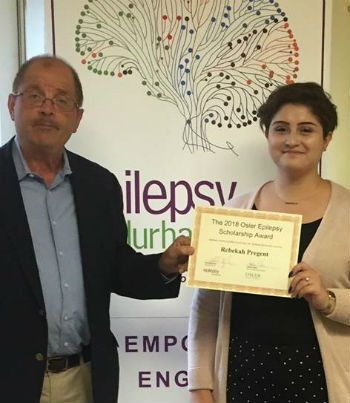By Deron Hamel
Rebekah Pregent has a knack for helping others and educating people about epilepsy whenever possible. It’s fitting that she’s studying to become a paramedic, a career that will enable her to put her passions to work.

When applying for an Osler Epilepsy Scholarship this year, Rebekah was asked to write about a person who has inspired her and who, like herself, is living with epilepsy. She chose Susan Boyle, the Scottish singer who shot to fame after singing I Dreamed a Dream from Les Miserables on Britain’s Got Talent in 2009.
“The reason that Boyle has inspired me is because she never let epilepsy stand in the way of her dreams,” Rebekah says. “Regardless of the fact that she was bullied for being different, she did not let others tear her down and stop her from achieving her goals.”
Rebekah was diagnosed with epilepsy three years ago. Since her diagnosis, she has advocated for herself and made it a mission to educate others about what epilepsy is and how it affects people living with the condition. She has blogged about living with epilepsy and even worked last summer at Epilepsy Durham Region.
Rebekah notes that Boyle has also publicly shared her story about living with epilepsy which, she says, helps others living with the condition “feel less alone.”
“I believe that Boyle’s story is closely related to mine,” Rebekah says. “Although I was never bullied, I took every chance that I could to educate others about epilepsy. This was particularly the case when I was newly diagnosed.”
Having a career as a paramedic will provide Rebekah with a chance to further educate others about epilepsy, she says.
“As a paramedic, I will continue to help those living with epilepsy and seizure disorders while helping many others through their daily lives,” Rebekah says.
Rebekah is one of the recipients of this year’s Osler Epilepsy Scholarship. The $1,500 scholarship, formerly called the OBCL Epilepsy Scholarship, is being offered to five students this year.
Osler Epilepsy Scholarships are awarded each year to exceptional students who have confronted and overcome remarkable barriers in their academic and personal lives due to their epilepsy.
Applicants also submit a 600- to 900-word essay, about a famous person who has epilepsy and what that person’s life means to them.






